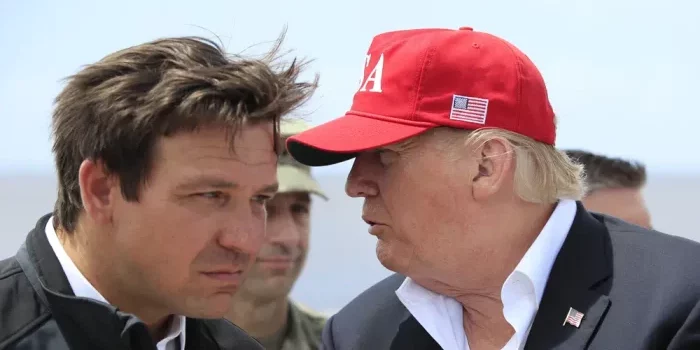(Phil Wegmann, RealClear Wire) As Ron DeSantis emerges as a prospective rival for the Republican nomination, Donald’s Trump campaign has put word out that anyone who works for the Florida governor will be blackballed.
According to sources with direct knowledge of the edict, Justin Caporale, who helps lead the advance team for the former president, has said that anyone who staffed a recent DeSantis book tour will be considered “persona non grata.” A top Trump ally was more comprehensive, telling RealClearPolitics that the prohibition would apply to more than just the junior aides tasked with setting up folding chairs and hanging banners.
“It’s a time for choosing,” the source close to the former president said. “If you work for Ron DeSantis’ presidential race, you will not work for the Trump campaign or in the Trump White House.”
The threat comes as Trump enjoys a commanding lead in the 2024 GOP presidential primary field. A declared candidate unlike DeSantis, Trump remains the frontrunner and has built a double-digit advantage in early polling. He initially sounded ready to welcome the Florida governor to the primary race, telling reporters at CPAC last month the decision was “up to him.” And when asked about another challenger, his former ambassador to the United Nations Nikki Haley who declared last month, Trump replied simply, “the more, the merrier.”
He apparently didn’t mean that literally. Trump has soured on DeSantis. His recent attacks are sharper than the usual nicknames that serve almost as a rite of passage for any rivals. The Florida governor is still “Ron DeSanctimonious,” but after an interview with Piers Morgan on Fox Nation, Trump responded by blasting DeSantis as “an average governor” and “a disciple of Paul Ryan.”
And while a DeSantis announcement isn’t expected until after Florida’s legislature wraps up its session later this spring, Trump is not waiting for the governor to make things official. Trump made that clear in a lengthy statement Wednesday night, writing that the potential rival’s “polls have crashed” and DeSantis “is finally admitting he is in the race by beginning to fight back.”
The split became personal when DeSantis broke his silence on Trump’s possible indictment, telling reporters he had “no interest” in inserting himself into “some type of manufactured circus by some Soros DA.”
Loyalty tests are nothing new for Trump. Numerous Republicans were disqualified for positions in his administration if it was discovered they had publicly criticized him during the 2016 campaign. Exceptions were possible, but only after apologies were tendered. His demands for fidelity reportedly caused headaches during the presidential transition.
As conservatives find themselves pulled between the old champion and a new challenger, some caution that blacklists are inherently counterproductive. “If Trump wins, he’ll need to hire the very best people he can,” said Mick Mulvaney, who served as the third chief of staff in the Trump White House and who previously endorsed Sen. Rand Paul for the Republican nomination. “Whoever is advising him to exclude folks who support other Republicans in a primary don’t have a clue as to how to run a government.”
Republicans will need to unite around whoever wins the nomination, a prominent conservative grassroots organizer added, warning that division this early makes unity later more difficult.
“Even after the most effective Republican presidency, Trump is bringing back the loyalty test,” the organizer said. “Not loyalty to the country – but for a single candidate. It’s the American people who will ultimately decide who is the next president and many grassroots see through these desperate pleas for allegiance and instead wish there was a substantive debate about the future of our great country.”
Others in Trump’s orbit saw more bluster in the staffing proclamation. “He was very forgiving. He was willing to let all those people work for him,” a former senior administration official said of vocal critics during the 2016 campaign who later closed ranks with the former president.
At the Republican National Convention that year, for instance, cameras caught Ken Cuccinelli throwing his credentials down in disgust when GOP brass thwarted his attempt to secure a rule vote that could have complicated Trump’s nomination. After an audience in the Oval Office, Trump tapped the former political opponent to lead Citizenship and Immigration Services.
The former official pointed to those kinds of hires to downplay any preemptive staffing prohibitions. “I don’t think, just knowing him, that it’s a serious assertion,” they said. “This is just being done now to try to kill the momentum that DeSantis has – this doesn’t jive with his past behavior.”
If Trump follows through, however, it could complicate the work of two influential conservative organizations already preparing for a Republican presidential transition. The Heritage Foundation launched a transition project last summer to vet potential staff and hired Paul Dans, the former chief of staff of Trump’s Office of Personnel Management, to lead the project. The America First Policy Institute, a think tank led by Trump alum Brooke Rollins that also includes reformed Trump critics like former Louisiana Gov. Bobby Jindal, has also been working for more than a year to assemble an unofficial “Trump White House in waiting.”
The demands of modern campaigning could eventually soften fealty requirements if Trump wins the Republican nomination and earns a rematch with President Biden. But sources close to the former president are adamant that one person has already flunked the loyalty test.
“It is very bad politics. This is a critical moment,” a prominent Republican operative said of the DeSantis decision not to rally to Trump’s defense. “I don’t know of any Republican voter that feels okay about what’s happening with President Trump.” The looming indictment, they added, was “the only thing that matters.”
A spokeswoman for DeSantis declined to comment.

